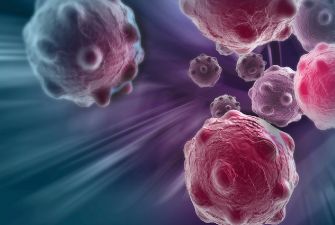Industry NewsGenitourinary Cancer
Research Uncovers Mechanism for Treatment Resistance in mCRPC
 New findings from a Prostate Cancer Foundation (PCF)-funded investigator reveal the mechanisms underlying anti-tumor immune responses and immunotherapy resistance in metastatic castration-resistant prostate cancer (mCRPC), one of the most aggressive molecular subsets of prostate cancer, as well as a promising new combination therapy that could prevent them from developing this ability. The research, recently published in the journal Molecular Cancer Therapeutics, was led by Akash Patnaik, MD, PhD, MMSc, and his team at the University of Chicago.
New findings from a Prostate Cancer Foundation (PCF)-funded investigator reveal the mechanisms underlying anti-tumor immune responses and immunotherapy resistance in metastatic castration-resistant prostate cancer (mCRPC), one of the most aggressive molecular subsets of prostate cancer, as well as a promising new combination therapy that could prevent them from developing this ability. The research, recently published in the journal Molecular Cancer Therapeutics, was led by Akash Patnaik, MD, PhD, MMSc, and his team at the University of Chicago.
"These findings represent an exciting new opportunity to reprogram prostate cancer cells to be more sensitive to immunotherapy and a promising combination therapy approach for metastatic castration-resistant prostate cancer," said Howard R. Soule, PhD, Executive Vice President and Chief Science Officer of the Prostate Cancer Foundation. "PCF commends Dr. Patnaik and the research team on their achievement and proudly supports their work to bring us closer to our mission to eliminate death and suffering from prostate cancer."
In prostate and many other cancers, an increase of tumor-infiltrating T cells and other genomic alterations within the tumor microenvironment (TME) – a 'T cell inflamed gene signature' – enhances responsiveness to immunotherapy, and non-inflamed or immunologically "cold" TMEs have the opposite effect. One of the most common alterations, seen in approximately 75% of mCRPC patients and enriched following treatment with androgen deprivation therapy (ADT), is loss or silencing of the retinoblastoma (Rb) tumor suppressor signaling pathway, leading to cancer progression, and poor prognosis and responsiveness to standard treatments. Patnaik and colleagues looked at how loss of Rb alters the tumor in order to potentially target these molecular pathways to make immunotherapy more effective.
To better understand the mechanisms of this highly aggressive Rb-deficient form of mCRPC, the researchers analyzed human tumor samples for expression of a T cell inflamed gene signature and found that Rb loss was predominantly associated with an immunologically cold microenvironment. Critical factors in regulating gene transcription downstream of Rb are the bromodomain and extraterminal domain (BET) family of DNA readers. Finding similar decreased immune infiltration in Rb-deficient prostate cancer in mice as they observed in Rb-deficient mCRPC patients, researchers then tested a BET inhibitor alone and in combination with immune checkpoint blockade and ADT. Mice treated with the BET inhibitor had a 4-fold increase in infiltrating T cells compared to controls. Those treated concurrently with anti-PD-1 immunotherapy and ADT had significantly enhanced anti-cancer response, showing that BET inhibition can reprogram the cold Rb-deficient microenvironment and sensitize mCRPC to immunotherapy.
In parallel with these mechanistic insights from the laboratory, Patnaik and colleagues are conducting a phase 2 clinical trial to test the efficacy of this combination approach in mCRPC patients who have developed Rb-deficient disease following intensified ADT treatment. If successful, the research could result in a new precision immunotherapy regimen for these patients.
